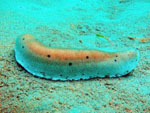
Sea cucumbers are not vegetables that grow in the sea, but ancient marine creatures that live on the floor of the world’s oceans. They benefit the ocean just like earthworms benefit the soil.
Traditionally fished in Indonesia by small watercraft, sea cucumbers are usually dried. They therefore need to be re-hydrated by soaking and boiling in water prior to being used in soups and stews. Freshly caught sea cucumbers are consumed to a lesser extent.
Described as tasteless and bland, yet considered a delicacy in Chinese cuisine, sea cucumbers are believed to be aphrodisiacs and have medicinal uses. They are called trepang in Indonesia, namako in Japan, balatan in Philippines, gamat in Malaysia, and bêche de mer (meaning sea spade) in France. Several species are also “harvested” in other parts of the world like the Great Barrier Reef of Australia, the reefs off Florida, USA – and India!
In India sea cucumbers are found in the Andaman and Nicobar Islands, Lakshwadeep Islands, Gulf of Mannar and Palk Bay. They were in abundance till the 1990s after which they were over-exploited for export to Singapore. The manner in which they are caught remains unchanged: fishermen dive 12 metres down into the sea and pick them up.
As their collection was banned in 2002, illegal catching and smuggling commenced and continues. Many illegal consignments of sea cucumbers weighing as little as 70 kilograms to as much as 1,600 kilograms have been seized 2010 onwards at different places like Devipattinam, Rameswaram and Bengaluru. Large quantities are known to be smuggled to Indonesia, Japan and Sri Lanka.
It is also unfortunate that sea cucumbers (along with seahorses) often being passed off as “by-catch” in South India. 2017 investigations revealed that as a result of bottom trawling, sea cucumbers and seahorses were being sold off for Rs 4/- a kilogram or even at Rs 2/- a kilogram, and ended up as poultry or fish feed.
In January 2016, 200 kgs of sea cucumbers were seized while being smuggled out from Tamil Nadu to Sri Lanka. Earlier in April 2014, a Sri Lankan vessel was illegally catching sea cucumbers around the Lakshwadeep Islands. India’s Coast Guard arrested the crew and seized the vessel containing an astonishingly high quantity of 2 metric tonnes of sea cucumbers (internationally valued at $120,000) along with sophisticated diving and other equipment for preserving the catch. The confiscated sea cucumbers were later auctioned by the Fisheries Department. This was not the first time that a foreign fishing vessel containing sea cucumbers was caught.
The Union Ministry of Environment & Forests, wanting to de-list some species, consulted the Zoological Survey of India (ZSI) with regard to sea cucumbers. In February 2013, the ZSI strongly recommended that sea cucumbers be retained in Schedule I of the Wild Life Protection Act, 1972. They were found in sea grass and coral reefs and played an important ecological role.
Although listed under CITES (Convention on International Trade in Endangered Species) instead of imposing a total ban the CMFRI (Central Marine Fisheries Research Institute, Kochi) and the FAO have produced documents encouraging the introduction of captive breeding and farming of sea cucumbers.
Last but not least, it is quite surprising that under India’s Import Policy 2012, aquatic invertebrates (like sea cucumbers, sea urchins and jellyfish) are allowed (marked “free”) to be imported for human consumption. BWC has requested the Director General of Foreign Trade to shift them to the “prohibited” category because their legal import can help poachers like the supply company owner and restaurant manager of Hotel Taj Mansingh, New Delhi, who were arrested for serving sea cucumbers in March 2010.
In January 2020 the kingpin of the illegal international sea cucumber trade was at long last arrested in Lakshadweep. BWC hopes this will bring their harvest and smuggling to an end.
The Wildlife Conservation Society’s Illegal Trade of Marine Species in India 2015-21 Report states 120 sea cucumbers, 18 sea fans (a variety of coral), 16 seahorse & pipefish, and 16 seashells, corals & calcareous sponge marine wildlife was seized and cases registered during the 7 year period. They were being smuggled to China, Malaysia, Singapore, Hong Kong, Sri Lanka, Pakistan and Dubai.
A report states that over 100 tonnes of sea cucumbers which are crucial for marine ecosystems were seized in illegal wildlife trade from 2010 to 2021.
In April 2023 sea cucumbers weighing 105 kgs were seized by the Indian Coast Guard (ICG) near Attangarai in Ramanathapuram district (Tamil Nadu). Then in May 2023, a catch of 260 kgs of sea cucumbers from the Edaiyarvalasai seashore were seized by the ICG. Hardly a month later in June 2023 as much as 1,137 kgs of sea cucumber worth over 5 crores was dumped in the sea near Mandapam in Ramanathapuram district, and was also seized by the ICG.
Ramanthapuram district in Tamil Nadu is where sea cucumbers are frequently seized. Valued at 3 crore, 690 kgs were seized by forest department officials from a house in Natham village of Ramanathapuram district in August 2023. In October 2023 the ICG also detained 5 men and their fishing boat on finding that they were smuggling 45 kgs of sea cucumbers – on spotting the ICG vessel the trawler dumped the sea cucumbers in the sea off Dhanushkodi coast but they were brought to Mandapam and handed over to the Forest Department.
|